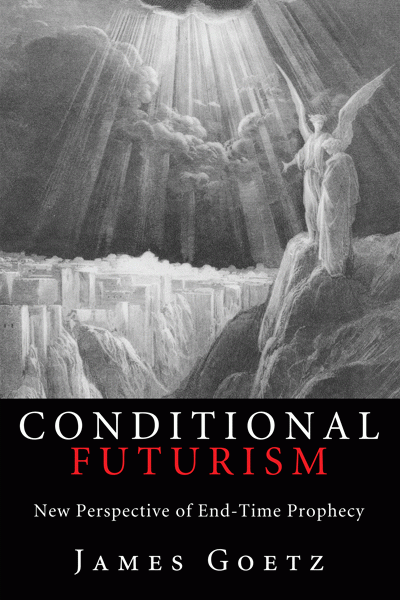My biblical theology Conditional Futurism briefly discusses imagery of postmortem evangelism in 1 Peter and imagery of postmortem conversions in Revelation. I also support that the biblical imagery teaches about the reality of postmortem conversions. Beyond that book, I believe that postmortem conversions will eventually result in universalism, which means that every human will eventually enjoy the gift of salvation. Some critics object to my conclusion of universalism. For example, some object to the conclusions of my biblical research about postmortem conversions. Others object that the concept of universalism is impossible because universalism implies that God would violate human free will while God would never do that. This brief piece focuses on objections to genuine free will and universalism.
Theologian Roger Olson in his 2015 blog post "Universalism Is 'In the Air'...." says that universalists are soft-hearted Calvinists while Arminians are immune to universalism. Olson's generalization derives from the contrasting Calvinist and Arminian views of free will and saving grace. For example, Calvinism teaches the doctrine of irresistible grace, which means that humans cannot resist God's gracious gift of faith and salvation. I want to emphasize that irresistible grace implies that humans immediately accept salvation when God offers salvation and that momentary resistance to God's offer is impossible. Alternatively, Arminianism teaches the doctrine of prevenient grace. Prevenient grace is resistible grace that enables humans to accept faith in God and the gift of salvation.
Calvinism is typically associated with theological determinism. Theological determinism means that God meticulously determines every detail in the universe such as the greatest human joys, the foremost human horrors, and trivial events such as the formation of dust bunnies. Some adherents of theological determinism believe that free will is compatible with determinism, which is called classical compatibilist free will or soft determinism. Other theological determinists reject the existence of free will, which is called hard determinism.
In contrast to Calvinism, Arminianism is associated with traditional incompatibilism, which means that free will exists while free will is incompatible with determinism. For example, Arminianism teaches that humans can possibly resist God's loving gift of saving grace. Arminianism also implies partial determinism and concomitant partial indeterminism.
The strongest form of incompatibilism is what I call unrestricted free will. Examples include Cartesian free will. The concept of unrestricted free will supposes that human will lacks the slightest constraint and that humans perpetually possess the power of contrary choice while no possible human action is literally irresistible. For instance, no human could possibly face a literally irresistible enticement.
Weak forms of incompatibilism are what I call restricted free will. Examples include Peter van Inwagen's model of free will. Restricted free will means that a human sometimes possesses the power of contrary choice. For instance, a human can sometimes act contrary to what they do and sometimes face a literally irresistible enticement for a particular course of action.
Consider two examples of restricted free will. First, a woman faces nothing except three mutually exclusive courses of action that she supposes are equally beneficial. In this case, she would freely choose among the three alternatives. In the second example, she faces multiple courses of action and she delights in one possibility while she utterly disdains all other possibilities. The only delightful course of action is literally irresistible while she would never choose any other option.
I want to further illustrate these examples in an imaginary multiverse with an indefinite number of alternate histories. In the first example, the woman faces the same three mutually exclusive courses of action that she supposes are equally beneficial. In the second example, the same woman with the same past faces the same circumstance an indefinite number of times. This circumstance that is repeated an indefinite number of times results in three different alternate histories because the woman could freely choose among the three options. In the second example, she faces multiple courses of action and she delights in one possibility while she utterly disdains all other possibilities. In this multiverse, the same woman with the same past faces the same circumstance an indefinite number of times and always chooses the same delightful option. The option is irresistible regardless of how many times that she faces the same circumstance.
I add that a model might reject both hard determinism and the existence of free will. I categorize such models and hard determinism together into what I call unfree will.
I defined unrestricted free will, restricted free will, compatibilist free will, and unfree will to preface my explanation for how these categories impact the possibility of what I call conditional universalism. Also, the concept of conditional universalism at first glance looks like an oxymoron, but let me explain. Conditional universalism means that every human will eventually enjoy Christ's gift of salvation while the gift of salvation is nonetheless conditional. For example, Hebrews 11:6 emphasizes the vital importance of faith and says that all who approach God must believe that he exists and that he rewards those who seek him. Mere awareness of God saves nobody, but people are saved by God's gracious gift through the condition of faith. This condition applies to experiencing salvation in life or afterlife. Also, the concept of universalism is meaningless if some people forever rebel against God and likewise never reconcile with God.
Consider God's love and ministry to humans: Romans 5:8 says that God's love is demonstrated by Jesus Christ dying for the salvation of sinful people; 2 Peter 3:9 says that God wants to save all people; as previously mentioned, 1 Peter and Revelation indicate imagery of postmortem lost people facing opportunities for salvation. Assuming the reality of (1) God desiring to save everybody and (2) postmortem offers of salvation, then one might conclude that God would eventually make an enticingly irresistible offer of salvation to afterlife holdouts if God could make irresistible offers. Among the four categories of human free will that I discussed, unrestricted free will is the only category that is incompatible with irresistible offers. That case leaves room for the hope of universalism while God cannot ensure universalism. However, restricted free will, compatibilist free will, and unfree will are compatible with irresistible offers. These models of free will are logically consistent with conditional universalism.
I believe in restricted free will and identify that my theology is modified Arminianism. For example, I believe that resistible prevenient grace is the general rule and God wants everybody to convert within the realm of resistible grace. This helps the development of human agency. However, I also believe that God never ceases to reach out to humans regardless of death. Moreover, God's love would eventually reveal an irresistible offer to any recalcitrant afterlife holdout. This ensures the glorious universal reconciliation. Marvelous benefits include believers reuniting with loved ones who passed away lost and all archenemies making peace with each other.
Copyright 2015 James Edward Goetz(Article changed on March 23, 2015 at 21:56)






